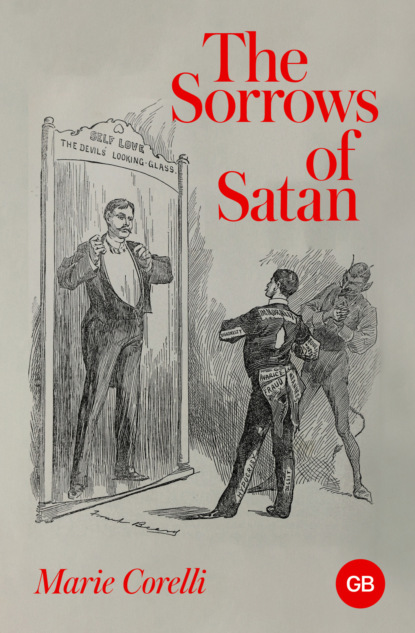По всем вопросам обращайтесь на: info@litportal.ru
(©) 2003-2025.
✖
The Sorrows of Satan
Настройки чтения
Размер шрифта
Высота строк
Поля
“No,” I answered with a touch of indignation—“I do not find it stupid.”
“Dull then?”
“No,—it is not dull.”
“Melodramatic?”
“No,—not melodramatic.”
“Well, my good fellow, if it is not dull or stupid or melodramatic, what is it!” he exclaimed merrily—“It must be something!”
“Yes,—it is this,—it is beyond me altogether.” And I spoke with some bitterness. “Quite beyond me. I could not write it now,—I wonder I could write it then. Lucio, I daresay I am talking foolishly,—but it seems to me I must have been on some higher altitude of thought when I wrote the book,—a height from which I have since fallen.”
“I’m sorry to hear this,” he answered, with twinkling eyes—“From what you say it appears to me you have been guilty of literary sublimity. Oh bad, very bad! Nothing can be worse. To write sublimely is a grievous sin, and one which critics never forgive. I’m really grieved for you, my friend—I never thought your case was quite so desperate.”
I laughed in spite of my depression.
“You are incorrigible, Lucio!” I said—“But your cheerfulness is very inspiriting. All I wanted to explain to you is this,—that my book expresses a certain tone of thought which purporting to be mine, is not me,—in short, I, in my present self have no sympathy with it. I must have changed very much since I wrote it.”
“Changed? Why yes, I should think so!” and Lucio laughed heartily—“The possession of five millions is bound to change a man considerably for the better—or worse! But you seem to be worrying yourself most absurdly about nothing. Not one author in many centuries writes from his own heart or as he truly feels—when he does, he becomes well-nigh immortal. This planet is too limited to hold more than one Homer, one Plato, one Shakespeare. Don’t distress yourself—you are neither of these three! You belong to the age, Tempest,—it is a decadent ephemeral age, and most things connected with it are decadent and ephemeral. Any era that is dominated by the love of money only, has a rotten core within it and must perish. All history tells us so, but no one accepts the lesson of history. Observe the signs of the time,—Art is made subservient to the love of money—literature, politics and religion the same,—you cannot escape from the general disease. The only thing to do is to make the best of it,—no one can reform it—least of all you, who have so much of the lucre given to your share.”
He paused,—I was silent, watching the bright fire-glow and the dropping red cinders.
“What I am going to say now,” he proceeded in soft, almost melancholy accents—“will sound ridiculously trite,—still it has the perverse prosiness of truth about it. It is this—in order to write with intense feeling, you must first feel. Very likely when you wrote this book of yours, you were almost a human hedge-hog in the way of feeling. Every prickly point of you was erect and responsive to the touch of all influences, pleasant or the reverse, imaginative or realistic. This is a condition which some people envy and others would rather dispense with. Now that you, as a hedge-hog, have no further need for either alarm, indignation or self-defence, your prickles are soothed into an agreeable passiveness, and you partially cease to feel. That is all. The ‘change’ you complain of is thus accounted for;—you have nothing to feel about,—hence you cannot comprehend how it was that you ever felt.”
I was conscious of irritation at the calm conviction of his tone.
“Do you take me for such a callous creature as all that?” I exclaimed—“You are mistaken in me, Lucio. I feel most keenly–”
“What do you feel?” he inquired, fixing his eyes steadily upon me—“There are hundreds of starving wretches in this metropolis,—men and women on the brink of suicide because they have no hope of anything in this world or the next, and no sympathy from their kind—do you feel for them? Do their griefs affect you? You know they do not,—you know you never think of them,—why should you? One of the chief advantages of wealth is the ability it gives us to shut out other people’s miseries from our personal consideration.”
I said nothing,—for the first time my spirit chafed at the truth of his words, principally because they were true. Alas, Lucio!—if I had only known then what I know now!
“Yesterday,” he went on in the same quiet voice—“a child was run over here, just opposite this hotel. It was only a poor child,—mark that ‘only.’ Its mother ran shrieking out of some back-street hard by, in time to see the little bleeding body carted up in a mangled heap. She struck wildly with both hands at the men who were trying to lead her away, and with a cry like that of some hurt savage animal fell face forward in the mud—dead. She was only a poor woman,—another ‘only.’ There were three lines in the paper about it headed ‘Sad Incident.’ The hotel-porter here witnessed the scene from the door with as composed a demeanor as that of a fop at the play, never relaxing the serene majesty of his attitude,—but about ten minutes after the dead body of the woman had been carried out of sight, he, the imperial, gold-buttoned being, became almost crook-backed in his servile haste to run and open the door of your brougham, my dear Geoffrey, as you drove up to the entrance. This is a little epitome of life as it is lived now-a-days,—and yet the canting clerics swear we are all equal in the sight of heaven! We may be, though it does not look much like it,—and if we are, it does not matter, as we have ceased to care how heaven regards us. I don’t want to point a moral,—I simply tell you the ‘sad incident’ as it occurred,—and I am sure you are not the least sorry for the fate of either the child who was run over, or its mother who died in the sharp agony of a suddenly broken heart. Now don’t say you are, because I know you’re not!”
“How can one feel sorry for people one does not know or has never seen,—” I began.
“Exactly!—How is it possible? And there we have it—how can one feel, when one’s self is so thoroughly comfortable as to be without any other feeling save that of material ease? Thus, my dear Geoffrey, you must be content to let your book appear as the reflex and record of your past when you were in the prickly or sensitive stage,—now you are encased in a pachydermatous covering of gold, which adequately protects you from such influences as might have made you start and writhe, perhaps even roar with indignation, and in the access of fierce torture, stretch out your hands and grasp—quite unconsciously—the winged thing called Fame!”
“You should have been an orator,”—I said, rising and pacing the room to and fro in vexation,—“But to me your words are not consoling, and I do not think they are true. Fame is easily enough secured.”
“Pardon me if I am obstinate;”—said Lucio with a deprecatory gesture—“Notoriety is easily secured—very easily. A few critics who have dined with you and had their fill of wine, will give you notoriety. But fame is the voice of the whole civilized public of the world.”
“The public!” I echoed contemptuously—“The public only care for trash.”
“It is a pity you should appeal to it then;”—he responded with a smile—“If you think so little of the public why give it anything of your brain? It is not worthy of so rare a boon! Come, come Tempest,—do not join in the snarl of unsuccessful authors who take refuge, when marked unsaleable, in pouring out abuse on the public. The public is the author’s best friend and truest critic. But if you prefer to despise it, in company with all the very little literature-mongers who form a mutual admiration society, I tell you what to do,—print just twenty copies of your book and present these to the leading reviewers, and when they have written you up (as they will do—I’ll take care of that) let your publisher advertise to the effect that the ‘First and Second Large Editions’ of the new novel by Geoffrey Tempest, are exhausted, one hundred thousand copies having been sold in a week! If that does not waken up the world in general, I shall be much surprised!”
I laughed,—I was gradually getting into a better humour.
“It would be quite as fair a plan of action as is adopted by many modern publishers,” I said—“The loud hawking of literary wares now-a-days reminds me of the rival shouting of costermongers in a low neighbourhood. But I will not go quite so far,—I’ll win my fame legitimately if I can.”
“You can’t!” declared Lucio with a serene smile—“It’s impossible. You are too rich. That of itself is not legitimate in Literature, which great art generally elects to wear poverty in its button-hole as a flower of grace. The fight cannot be equal in such circumstances. The fact that you are a millionaire must weigh the balance apparently in your favour for a time. The world cannot resist money. If I, for example, became an author, I should probably with my wealth and influence, burn up every one else’s laurels. Suppose that a desperately poor man comes out with a book at the same time as you do, he will have scarcely the ghost of a chance against you. He will not be able to advertise in your lavish style,—nor will he see his way to dine the critics as you can. And if he should happen to have more genius than you, and you succeed, your success will not be legitimate. But after all, that does not matter much—in Art, if in nothing else, things always right themselves.”
I made no immediate reply, but went over to my table, rolled up my corrected proofs and directed them to the printers,—then ringing the bell I gave the packet to my man, Morris, bidding him post it at once. This done, I turned again towards Lucio and saw that he still sat by the fire, but that his attitude was now one of brooding melancholy, and that he had covered his eyes with one hand on which the glow from the flames shone red. I regretted the momentary irritation I had felt against him for telling me unwelcome truths,—and I touched him lightly on the shoulder.
“Are you in the dumps now Lucio?” I said—“I’m afraid my depression has proved infectious.”
He moved his hand and looked up,—his eyes were large and lustrous as the eyes of a beautiful woman.
“I was thinking,” he said, with a slight sigh—“of the last words I uttered just now,—things always right themselves. Curiously enough in art they always do,—no charlatanism or sham lasts with the gods of Parnassus. But in other matters it is different. For instance I shall never right myself! Life is hateful to me at times, as it is to everybody.”
“Perhaps you are in love?” I said with a smile.
He started up.
“In love! By all the heavens and all the earths too, that suggestion wakes me with a vengeance! In love! What woman alive do you think could impress me with the notion that she was anything more than a frivolous doll of pink and white, with long hair frequently not her own? And as for the tom-boy tennis-players and giantesses of the era, I do not consider them women at all,—they are merely the unnatural and strutting embryos of a new sex which will be neither male nor female. My dear Tempest, I hate women. So would you if you knew as much about them as I do. They have made me what I am, and they keep me so.”
“They are to be much complimented then,”—I observed—“You do them credit!”
“I do!” he answered slowly—“In more ways than one!” A faint smile was on his face, and his eyes brightened with that curious jewel-like gleam I had noticed several times before. “Believe me, I shall never contest with you such a slight gift as woman’s love, Geoffrey. It is not worth fighting for. And apropos of women, that reminds me,—I have promised to take you to the Earl of Elton’s box at the Haymarket to-night,—he is a poor peer, very gouty and somewhat heavily flavoured with port-wine, but his daughter, Lady Sibyl, is one of the belles of England. She was presented last season and created quite a furore. Will you come?”
“I am quite at your disposition”—I said, glad of any excuse to escape the dullness of my own company and to be in that of Lucio, whose talk, even if its satire galled me occasionally, always fascinated my mind and remained in my memory—“What time shall we meet?”
“Go and dress now, and join me at dinner,”—he answered; “And we’ll drive together to the theatre afterwards. The play is on the usual theme which has lately become popular with stage-managers,—the glorification of a ‘fallen’ lady, and the exhibition of her as an example of something superlatively pure and good, to the astonished eyes of the innocent. As a play it is not worth seeing,—but perhaps Lady Sibyl is.”
He smiled again as he stood facing me,—the light flames of the fire had died down to a dull uniform coppery red,—we were almost in darkness, and I pressed the small button near the mantelpiece that flooded the room with electric light. His extraordinary beauty then struck me afresh as something altogether singular and half unearthly.
“Don’t you find that people look at you very often as you pass, Lucio?” I asked him suddenly and impulsively.
He laughed. “Not at all. Why should they? Every man is so intent on his own aims, and thinks so much of his own personality that he would scarcely forget his ego if the very devil himself were behind him. Women look at me sometimes, with the affected coy and kitten-like interest usually exhibited by the frail sex for a personable man.”
“I cannot blame them!” I answered, my gaze still resting on his stately figure and fine head with as much admiration as I might have felt for a noble picture or statue—“What of this Lady Sibyl we are to meet to-night,—how does she regard you?”
“Lady Sibyl has never seen me,”—he replied—“And I have only seen her at a distance. It is chiefly for the purpose of an introduction to her that the Earl has asked us to his box this evening.”
“Ha ha! Matrimony in view!” I exclaimed jestingly.
“Yes—I believe Lady Sibyl is for sale,”—he answered with the callous coldness that occasionally distinguished him and made his handsome features look like an impenetrable mask of scorn—“But up to the present the bids have not been sufficiently high. And I shall not purchase. I have told you already, Tempest, I hate women.”
“Seriously?”
“Most seriously. Women have always done me harm,—they have wantonly hindered me in my progress. And why I specially abominate them is, that they have been gifted with an enormous power for doing good, and that they let this power run to waste and will not use it. Their deliberate enjoyment and choice of the repulsive, vulgar and common-place side of life disgusts me. They are much less sensitive than men, and infinitely more heartless. They are the mothers of the human race, and the faults of the race are chiefly due to them. That is another reason for my hatred.”
“Do you want the human race to be perfect?” I asked astonished—“Because, if you do, you will find that impossible.”
He stood for a moment apparently lost in thought.
“Everything in the Universe is perfect,”—he said, “except that curious piece of work—Man. Have you never thought out any reason why he should be the one flaw,—the one incomplete creature in a matchless Creation?”

















